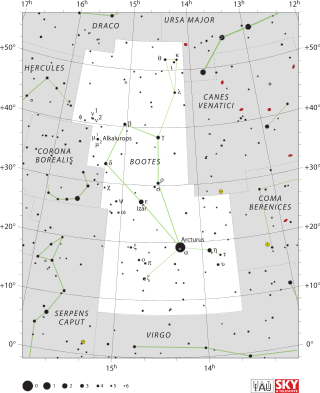Kappa Boötis
Double star in the constellation of Boötes From Wikipedia, the free encyclopedia
Kappa Boötis (κ Boo, κ Boötis) is a double star in the constellation Boötes. It has the traditional name Asellus Tertius /əˈsɛləs ˈtɜːrʃiəs/ (Latin for "third donkey colt")[13][14] and the Flamsteed designation 17 Boötis. The components are separated by an angular distance of 13.5 arcsec,[14] viewable in a small telescope. Kappa Boötis is approximately 155 light years from Earth.
| Observation data Epoch J2000 Equinox J2000 | |
|---|---|
| Constellation | Boötes |
| κ1 Boötis | |
| Right ascension | 14h 13m 27.824s[1] |
| Declination | +51° 47′ 16.62″[1] |
| Apparent magnitude (V) | +6.69[2] |
| κ2 Boötis | |
| Right ascension | 14h 13m 29.009s[3] |
| Declination | +51° 47′ 23.88″[3] |
| Apparent magnitude (V) | +4.50 to +4.58[4] |
| Characteristics | |
| κ1 Boötis | |
| Spectral type | F2V[5] |
| κ2 Boötis | |
| Spectral type | A8IV[6] |
| U−B color index | 0.14 |
| B−V color index | 0.2 |
| R−I color index | 0.12 |
| Variable type | Delta Scuti variable[4] |
| Astrometry | |
| κ1 Boötis | |
| Radial velocity (Rv) | −22.09[1] km/s |
| Proper motion (μ) | RA: 44.094[1] mas/yr Dec.: −39.325[1] mas/yr |
| Parallax (π) | 20.3067±0.2221 mas[1] |
| Distance | 161 ± 2 ly (49.2 ± 0.5 pc) |
| Absolute magnitude (MV) | +3.34 |
| κ2 Boötis | |
| Radial velocity (Rv) | −15.60[7] km/s |
| Proper motion (μ) | RA: 44.094[3] mas/yr Dec.: −39.325[3] mas/yr |
| Parallax (π) | 21.1980 ± 0.4118 mas[3] |
| Distance | 154 ± 3 ly (47.2 ± 0.9 pc) |
| Details | |
| κ1 Boötis | |
| Mass | 1.40[8] M☉ |
| Radius | 1.43[1] R☉ |
| Luminosity | 3.801[1] L☉ |
| Surface gravity (log g) | 4.32[5] cgs |
| Temperature | 6,699[9] K |
| Metallicity [Fe/H] | −0.09[9] dex |
| Rotational velocity (v sin i) | 38[10] km/s |
| Age | 900[9] Myr |
| κ2 Boötis | |
| Mass | 2.12[11] M☉ |
| Radius | 2.78[11] R☉ |
| Luminosity | 28[6] L☉ |
| Surface gravity (log g) | 3.66[5] cgs |
| Temperature | 7,760[6] K |
| Metallicity [Fe/H] | −0.29[12] dex |
| Rotational velocity (v sin i) | 128[8] km/s |
| Other designations | |
| Asellus Tertius, κ Boo, 17 Boötis, BD+52 1782, HR 5328 | |
| κ1 Boötis: HD 124674, HIP 69481, SAO 29045 | |
| κ2 Boötis: HD 124675, HIP 69483, SAO 29046 | |
| Database references | |
| SIMBAD | data |
| κ1 | |
| κ2 | |
Nomenclature
κ2 Boötis, the brighter star of the pair, is also designated HD 124675, while κ1 Boötis is HD 124674. The two stars share the Bright Star Catalogue designation HR 5328, but they have separate entries in the Hipparcos catalogue: HIP 69483 and HIP 69481 respectively.
Properties

κ1 Boötis is a spectroscopic binary star system. The visible primary is an F2 main sequence star, while the secondary is half the mass and much fainter.[16]
κ2 Boötis is classified as a Delta Scuti type variable star with a period of 1.08 hours[6] Its brightness varies from magnitude +4.50 to +4.58.[4] It is a slightly evolved A8 subgiant.
A 17th-magnitude star nearly two arc-minutes away has been identified as a member of the multiple system with an estimated orbital period of 177,000 years. It is itself a close binary with two similar low-mass stars in a 234-year orbit.[17]
Etymology
This star, along with the other Aselli (θ Boo and ι Boo) and λ Boo, were Aulād al Dhiʼbah (أولاد الضّباع - awlād al-ḍibā‘), "the Whelps of the Hyenas".[18]
In Chinese, 天槍 (Tiān Qiāng), meaning Celestial Spear, refers to an asterism consisting of κ (actually κ2) Boötis, ι Boötis and θ Boötis.[19] Consequently, the Chinese name for κ Boötis itself is 天槍一 (Tiān Qiāng yī, English: the First Star of Celestial Spear.)[20]
References
External links
Wikiwand - on
Seamless Wikipedia browsing. On steroids.

